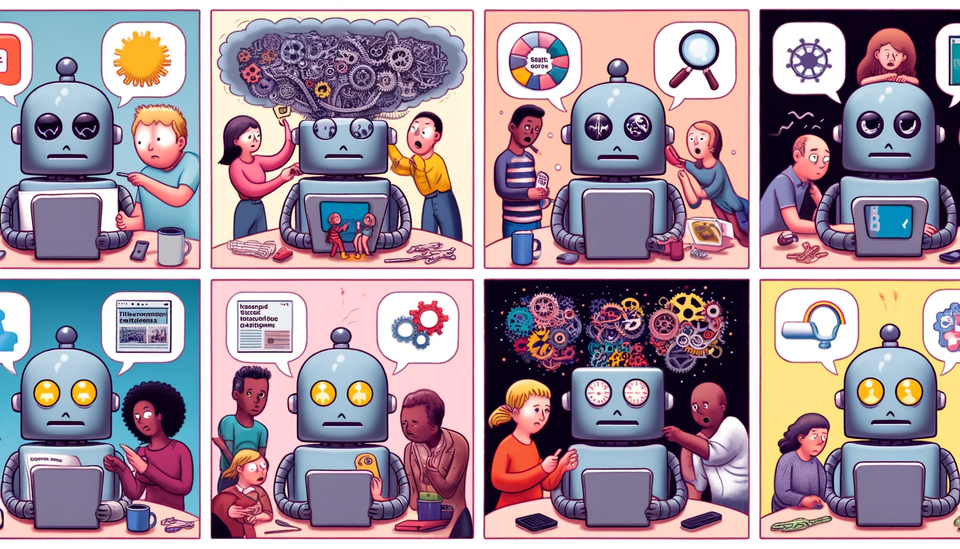- In the modern digital age, search engines have become integral to our daily lives, acting as gatekeepers to the vast information available on the internet. However, beneath the surface of these seemingly neutral tools lies a troubling reality: algorithms can and do perpetuate biases that reinforce existing social inequalities. This narrative explores the critical insights presented by Safiya Umoja Noble in "Algorithms of Oppression: How Search Engines Reinforce Racism" alongside themes from other seminal works on technology and society.
- Uncovering Technological Redlining
- Safiya Umoja Noble's "Algorithms of Oppression" sets the stage by highlighting the concept of "technological redlining," where automated decision-making processes reinforce racial profiling and discrimination. Noble's journey began with a troubling Google search in 2010. A search for "black girls" returned pornographic results, starkly illustrating how search engines can perpetuate harmful stereotypes. This wasn't an isolated glitch but rather a systemic issue rooted in the biases of those who create these algorithms and the profit-driven motives of companies like Google.
- Noble emphasizes that these discriminatory outcomes are embedded not only in search algorithms but also in AI technologies that rely on them. Her professional background in multicultural marketing and advertising exposed her to how companies exploit marginalized groups for profit. This exploitation became even more apparent when she delved into how search engines reinforce oppressive stereotypes, particularly against women and people of color. The realization that search results only improved after public pressure and algorithm updates underscores the need for greater accountability and transparency in tech companies.
- The Power of Search Engines
- In "A Society, Searching," Noble delves deeper into how search engines like Google shape our perception of information. Despite being marketed as neutral tools, these platforms are commercial entities with biases that can distort reality. Google's business model, heavily reliant on advertising, prioritizes profit over objectivity. Companies with deeper pockets can pay for prominent ad placements and search engine optimization (SEO), resulting in a skewed representation of information.
- Algorithms, as Noble points out, are not inherently neutral. They reflect the values, assumptions, and biases of their creators and the data they are trained on. This bias becomes evident in search results that reinforce stereotypes, especially concerning race and gender. For instance, searches involving women of color often yield hypersexualized or stereotypical content, reflecting broader societal prejudices.
- With their powerful algorithms and ubiquitous use, search engines have become gatekeepers of cultural knowledge. They determine which information is accessible and which voices are amplified or silenced. Noble argues that this disproportionate influence requires scrutiny and regulation to prevent the reinforcement of harmful stereotypes and discrimination. Public perception and trust in search engines as reliable sources of information exacerbate these issues, making it essential for users to develop media literacy skills to critically evaluate search results.
- Hypersexualization and the Lack of Diversity in Tech
- Chapter 2, "Searching for Black Girls," highlights the hypersexualization and degradation of Black women in search results. Noble recounts her experience of finding predominantly pornographic and offensive content when searching for "black girls." This is not a mere technical flaw but a reflection of societal prejudices that hypersexualize and dehumanize Black women. Google's profit-driven algorithms prioritize high-traffic commercial sites, often leading to the prominence of derogatory content.
- The lack of diversity in the tech industry contributes significantly to these biased search results. Many engineers and developers come from privileged backgrounds and may not recognize the biases in their algorithms due to their limited perspectives. This oversight perpetuates systems that disadvantage marginalized communities. The sociopolitical impact of these biases is profound, affecting public perception, job prospects, self-esteem, and policy. For younger users, these stereotypes can be internalized, shaping their identities and self-worth.
- Noble calls for systemic changes to counteract algorithmic biases. She emphasizes the importance of representation and inclusion in technology development and advocates for educational programs that enhance media literacy. Additionally, she argues for greater transparency and accountability in search algorithms, urging policymakers to regulate tech companies more effectively to ensure these systems do not perpetuate stereotypes or reinforce oppression.
- Broader Implications for Marginalized Communities
- In Chapter 3, "Searching for People and Communities," Noble expands her discussion to examine how search engines impact various marginalized groups beyond Black women. She points out that the biases affecting search results span across communities such as Native Americans, Latinx people, and Muslims, often returning stereotypical or degrading content. These misrepresentations distort public perception and perpetuate discrimination.
- LGBTQ+ issues are also misrepresented by search engines, with searches often yielding derogatory results or content associating the community with deviant behavior. This misinformation reinforces harmful stereotypes and affects the acceptance and treatment of LGBTQ+ individuals in society. Noble employs intersectionality to explain how search engine biases impact individuals differently based on multiple aspects of their identities, such as race, gender, sexual orientation, and socioeconomic status.
- Search engines often portray themselves as neutral arbiters of information, but Noble argues this is a myth. The results we see are influenced by commercial interests, user behavior, and systemic biases that prioritize popular or profitable content. This makes it difficult for marginalized communities to control their narratives. Noble calls for strategies to increase the visibility of marginalized communities online and to challenge harmful stereotypes. She advocates for stronger regulations, algorithmic audits, and corporate responsibility to ensure fairness in search results.
- Regulatory Landscape and Corporate Responsibility
- Chapter 4, "Searching for Protections from Search Engines," addresses the regulatory landscape and the inadequacy of existing legal frameworks to protect marginalized communities. Noble explains how Section 230 of the U.S. Communications Decency Act shields tech companies from liability for content posted by users, allowing companies like Google to avoid legal consequences for biased or harmful results. This provision, intended to foster free expression and innovation, has also enabled tech companies to evade responsibility.
- Noble argues that the tech industry's rapid growth has outpaced regulatory oversight, and self-regulation has proven inadequate in combating issues like misinformation, hate speech, and stereotyping. Legal cases challenging discrimination perpetuated by search engines often get dismissed because courts interpret Section 230 broadly, favoring tech companies.
- Noble calls for greater corporate responsibility and transparency in the tech sector. She proposes policy measures such as revising Section 230 to clarify liability exceptions for discriminatory content, creating regulatory bodies to oversee tech companies, encouraging algorithmic audits, and requiring companies to consult with diverse stakeholders when designing algorithms. These measures are essential to address algorithmic biases and their social consequences effectively.
- The Future of Knowledge and Information Culture
- In Chapter 5, "The Future of Knowledge in the Public," Noble discusses how search engines influence the distribution of knowledge and the formation of public opinion. The commercialization of search results has significant implications for information dissemination. Search engines prioritize results based on advertising revenue and SEO, often leading to the dominance of profitable but inaccurate information.
- This bias undermines public trust in the reliability of information, creating an environment where misinformation and propaganda can thrive. The digital divide exacerbates these issues, with marginalized groups facing barriers to accessing quality information due to socioeconomic and geographic disparities. The concentration of power in a few tech companies raises concerns about monopolistic control over knowledge, stifling diverse perspectives and reducing opportunities for marginalized voices to be heard.
- Noble argues that access to accurate information should be considered a public good and calls for regulations ensuring search engines prioritize educational and non-commercial content. She also suggests investing in media literacy education to help users critically evaluate search results and identify biases. Protecting the integrity of knowledge requires recognizing that search engines are not neutral and should be held accountable for their role in shaping public opinion.
- Shaping the Future of Information Culture
- In the final chapter, "The Future of Information Culture," Noble explores the evolving relationship between technology and culture. She examines how algorithmic systems increasingly shape cultural narratives and influence our understanding of the world. Noble introduces the concept of "algorithmic colonialism," describing how tech companies impose dominant cultural norms on marginalized communities. For instance, platforms like Facebook and Google, rooted in Western values, export their algorithms worldwide, often disregarding local contexts and reinforcing biases favoring the dominant group.
- Noble calls for greater representation of diverse voices in tech development to identify and mitigate biases embedded in algorithms. She advocates for expanding critical media literacy education to empower users to navigate the digital information landscape effectively. By understanding how search engines and social media platforms operate, users can critically analyze information and recognize biases or misinformation.
- Collaborative solutions are essential to address algorithmic bias. Noble calls for interdisciplinary collaboration among tech professionals, social scientists, policymakers, and civil society to account for the social implications of technology. She emphasizes the importance of regulatory frameworks to hold tech companies accountable, suggesting measures like mandatory audits for algorithmic bias, transparency requirements, and guidelines for ethical AI development.
- Noble concludes with hope for a future where technology promotes equity and inclusivity. She envisions a collaborative information culture where diverse voices are amplified, and algorithmic biases are actively challenged. Noble urges readers to remain vigilant about the role of technology in shaping society and to advocate for policies prioritizing fairness and social justice.
- Conclusion
- The insights presented by Safiya Umoja Noble in "Algorithms of Oppression" reveal the hidden biases in algorithms and their profound impact on marginalized communities. These biases are not mere technical flaws but systemic issues rooted in the profit-driven motives of tech companies and the lack of diversity in the tech industry. Addressing these challenges requires greater transparency, accountability, and regulation to ensure that search engines and other digital platforms do not perpetuate harmful stereotypes and discrimination.
- As we navigate the digital age, it is crucial to recognize the power of algorithms in shaping our perception of information and culture. By fostering a more inclusive and equitable digital landscape, we can harness the potential of technology to promote social justice and protect the integrity of knowledge. This narrative serves as a call to action for individuals, tech companies, and policymakers to work together to build a fairer, more inclusive digital future.


Member discussion